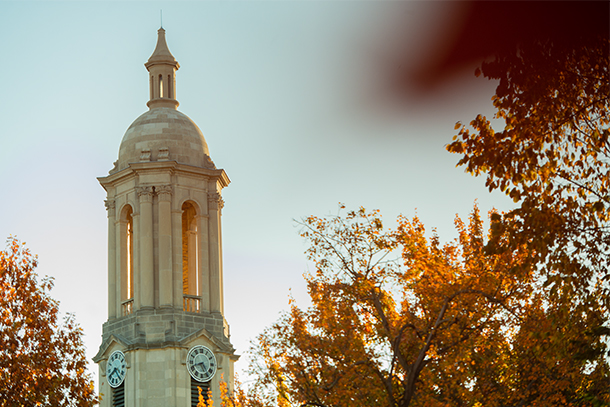
Five College of Engineering graduate students were selected for the National Science Foundation Graduate Research Fellowship Program. Credit: Penn State
Five engineering students receive NSF Graduate Research Fellowship
October 26, 2023
Editor’s note: A version of this story previously appeared on Penn State News.
UNIVERSITY PARK, Pa. — The Graduate School at Penn State welcomed 20 new National Science Foundation (NSF) Graduate Research Fellowship Program (GRFP) recipients for the 2023-24 academic year. Five College of Engineering graduate students received the fellowship, and two engineering graduate students were recognized as honorable mentions.
These students join 81 prior recipients continuing in the University’s graduate degree programs in the Eberly College of Science, College of Agricultural Sciences, College of Earth and Mineral Sciences, College of Engineering, College of Health and Human Development and the College of the Liberal Arts, as well as the Intercollege Graduate Degree Programs.
The NSF program supports outstanding graduate students in the science, technology, engineering and mathematics (STEM) disciplines; those in STEM education and learning research; and those in social and behavioral sciences, who are pursuing research-based master's and doctoral degrees.
The College of Engineering students in the 2023-24 class of new fellows are:
Sarabeth Brandt, doctoral student in electrical engineering
Brandt’s research focuses on designing systems for entomologists to monitor insect pollinators. She is currently developing a camera system that tracks individual honeybees, as well as studying ground penetrating radar as a method for monitoring ground-nesting bees. Brandt is advised by Julio Urbina, professor of electrical engineering.
Olivia Cook, doctoral student in engineering science and mechanics
Cook’s research focuses on the ultrasonic characterization of materials. She aims to interpret the changes in propagation characteristics of elastic waves to understand structural information about complex microstructures. Using ultrasound, Cook studies shape memory alloys to better understand microstructure-mechanical property relationships. Cook is advised by Andrea P. Argüelles, assistant professor in engineering science and mechanics.
Quinn Deitrick, master’s student in mechanical engineering
Deitrick is working to develop assistive technologies to help individuals with physical disabilities. Detrick is designing an experiment with an upper-body exoskeleton that can guide individuals in assistive-based, therapeutic tasks. Deitrick is advised by Katie Fitzsimon, assistant professor of mechanical engineering.
Matthew Hallissey, master’s student in civil engineering
Hallissey studies climate change-induced permafrost degradation and its impact on utility pipeline stability. He specifically focuses on Arctic and subarctic communities that exist on top of permafrost soils and experience negative impacts on their infrastructure due to the degradation. His research aims to find ways to assist these communities in navigating the changing conditions and challenges of the Arctic, including increased prices of utility pipeline systems and decreased access to potable water and wastewater treatment. Hallissey is advised by Ming Xiao, professor of civil and environmental engineering.
Mackenzie Mangette, master’s student in aerospace engineering
Mangette’s research focuses on data-driven modeling to identify Hamiltonian systems with applications to astrodynamics. Mangette aims to understand and quantify the dynamics of unknown models utilizing collected data with the goal of developing robust and resilient algorithms for guidance, navigation and control to support space operations in the area of space between the Earth and the moon. Mangette is advised by Roshan Eapen, assistant professor of aerospace engineering.
Two engineering students were also recognized as honorable mentions:
Jonah Glunt, master’s student in mechanical engineering
Glunt analyzes the interface between planning and control for fleets of autonomous vehicles, with a specific focus on robotic vehicles that perform tasks in dangerous environments without risking human lives, such as disaster relief, nuclear inspection and hazardous material clean-up. Glunt aims to create new capabilities in robust path planning and control under environmental uncertainty. Glunt is advised by Herschel Pangborn, assistant professor of mechanical engineering and of aerospace engineering.
Jeremie Pope, doctoral student in computer science and engineering
Pope aims to increase the stability and usability of a wide range of quantum computing-related tools, including quantum-enabled compilers and classical-quantum language integration. Pope also seeks to increase the availability of learning materials related to programming with quantum computers to help integrate and leverage them in the academic setting. Pope is advised by Swaroop Ghosh, associate professor of electrical engineering and of computer science and engineering.



